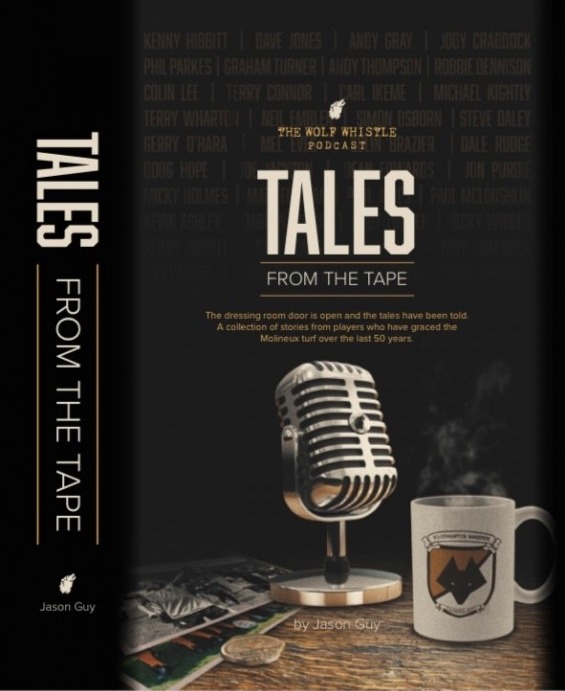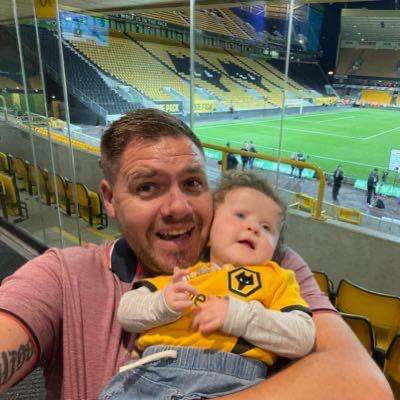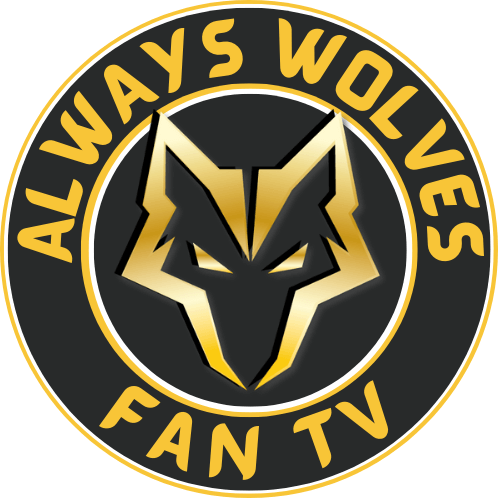
TALES FROM THE TAPE
MEL EVES
21 OR BUST
As he stood on the terraces at Wembley in 1974 watching Wolves lift the League Cup, a 17-year-old Mel Eves wouldn’t have believed you if you’d have told him that,six years later, he would be on the green baize emulating his heroes. That is exactly what happened.
Melvyn James Eves recounts his days as a youngster where, in his own words, he was born in a ‘little fishing village’ called Darlaston. It was the borough of Wednesbury that Mel and his publican family made their home, the now bulldozed Dartmouth Arms. Just a couple of years later the Herbert’s Park Tavern was the family home and then, from the age of seven, the Red Lion in Wednesfield.
Born to proud, Wolves supporting parents, Mel’s earliest football recollection was playing football at Pinfold Street School and his first organised football was at Woden Avenue. “I would play for hours and hours at King George V playing fields which is now commonly known as Wednesfield Park on Amos Lane. I then played for Long Knowle Athletic and then the county and just loved playing football. I was getting spotted but my father never told me. We had scouts knocking on the door unbeknown to me from when I was at the age of 11 or 12 but my Dad never told me. He didn’t want any pressure or expectations to be put on me and I owe such a lot to my parents.”
Mel’s father was of the belief, if his son was good enough to get spotted, it would always happen. Whereas many parents would jump at the chance of their son or daughter being at a professional club, Eves senior only wanted his son to enjoy his football and Mel confessed that the timing was perfect as he was a ‘late developer’. “I joined the club when I was 18, nearly 19 as I’d been encouraged to stay on in the sixth form. At the time I was 10 stone wringing wet, I needed to work on a lot of things including the technical side of the game and my fitness. I always had pace and the ability to be in the right place at the right time, but there was still work to do.”
Mel recalls an early training session where he realised the gulf in quality and where he needed to be. “Sammy Chung was the first team coach and we all had to go in pairs. I was paired up with Kenny Hibbitt. The drill was relatively straight forward – control right foot, pass with your left. Control on your left, pass with your right. It would start with me being on the touchline and Kenny five yards away, then the next set would be 10 yards away, then 15, then 20, 25 then 30 and so on. Kenny was using both feet, zinging it a millimetre off the ground like an Exocet missile straight to feet! I didn’t even have to move. On the return when I was playing it back to Kenny he was all over the park and he had to wring his shirt out at the end as my passing was all over the place!”
Mel had arrived. He worked tirelessly for his dream to come true and it wasn’t until the age of 21 that he made his first team debut. The reality is that in the modern game if you haven’t made the first team by 19 the opportunity is all but gone, but for Mel, being a late developer worked in his favour. “I remember the teamsheet being pinned up on the notice board and I had been selected. I had been training with the first team and involved with the set piece drills that week so I knew there was a chance. I was 21 and we were playing Bobby Robson’s Ipswich Town. The game finished 0-0 and I played up front with John Richards, my hero growing up.”
Mel still had work to do and although a late entrant to the game, he knew more than anyone that he still hadn’t quite made it and that, as with any striker, he would be judged on his goal return. “I played in four games and didn’t score but I didn’t feel any pressure and I just got my head down and kept working. The manager then made three or four changes to the team and I had to wait for my chance again.”
The patient Eves didn’t have to wait long. The setting was Stamford Bridge, April 22nd, 1978. A strong Chelsea side bolstered by the likes of hard-man Ron ‘Chopper’ Harris and Ray ‘Butch’ Wilkins were the formidable opponents and Mel made his entrance with a bang. “My first goal came against the great Peter Bonetti. The photo still hangs on the wall in my office today.” Mel’s next goal came against Manchester United the following game in a home fixture, his first at Molineux grabbing the winner 10 minutes from time in a 2-1 victory. Mel continued his goal streak with one against Aston Villa at Molineux just a few days later, notching in a comprehensive 3-1 win.
Mel had now passed the initiation and was at home in the dizzy heights of the First Division. Honours weren’t far away as he earned England ‘B’ recognition playing against, in Mel’s description, ‘the international giants of New Zealand and Singapore’. Throughout his career Mel had a notable one in four goals to game ratio, and what was particularly impressive was that he didn’t always play in his favoured position of striker. “I loved playing as a striker but with John Richards and Andy Gray also in the side it meant some games I had to play out wide. John Barnwell and Richie Barker initially spoke to me about moving position and I was happy to play out on the wing just to get a place in the team. When you look at the team we had in Palmer, Parkin, Hibbitt, Hughes, Carr etc, I was just happy to be playing around these players, many of whom I had been watching from the stands only a few years before.”
Arguably, Mel’s proudest moment came on that magnificent day in March 1980 where underdogs Wolves proudly lifted the League Cup. Mel had become familiarised with his heroes and this time he was on the pitch of the stadium where just six years before he had cheered them onto victory as a supporter. “1974 was the first time I’d been to Wembley. The next time I went I had a much better view as I was playing! Forest weren’t a good team, they were a brilliant team. The team was full of stars – Viv Anderson, Trevor Francis, who was the first million pound footballer. Cloughie was managing with Peter Taylor as his assistant and we knew it would be a tough game. Nottingham Forest had won the competition in 1978 and 1979 and were also the European Cup holders. Then they went on to win that again a few months later. Forest went on to finish fifth in the First Division and we finished just one place below. We didn’t fear anybody.”
Brave words from Mel, who had at this point cemented his place in Wolves history with a goal in the semi-final against Swindon. It didn’t start as sweetly as it ended after he had been dropped for the first leg. Mel recalls: “We lost the first-leg 2-1 and I had been dropped for Dave Thomas. I accepted it but then I got my chance at Molineux in the return fixture. Once again, it was 1-1 with ten minutes to go and I scored an overhead kick from the edge of the box to take the tie to extra time. King John then popped up and got the winner and we were Wembley bound.”
The next day after that historic win, John Barnwell got straight to work on his Wembley assault and he wasn’t taking any prisoners. “The following day we were called in for a debrief. Barney (John Barnwell) sat us all down and told us that we were playing a Forest side who had knocked Liverpool out in their semi-final and Liverpool went on to win the league that year and was sitting on top of the table. John told us straight that if any of us thought we were going to Wembley just to make up the numbers then to get out the dressing room right now and don’t come back. ‘WE ARE GOING TO WIN’, he told us.”
There were four players at Wembley that day who had defeated Manchester City in the League Cup Final in 1974. Messrs Geoff Palmer, Derek Parkin, Kenny Hibbitt and John Richards. The new breed at the forefront of the 1980 challenge were left in no uncertain terms of their responsibility. “We stopped their two main sources that day. We knew we had enough going forward and we were very organised. It wasn’t an exciting game as it was very tactical but we did enough to win. I remember getting a chance early in the second half, it was a header and I should have done better with it as I tried to knock it back to Andy Gray and was in two minds whether to head at goal or back to Andy. King John eventually got the ball in the net ten minutes later but it was disallowed and Peter Shilton was lucky to get the foul to be honest.”
Mel had achieved what he had set out to and it was him holding aloft the trophy to the thousands of adorning fans in a sea of Old Gold. “I remember it like it was yesterday,” Mel beamed. “I’ve still got the tankard from the day which in later years was replaced with medals. I’ve also got a 100% win record at Wembley as a player and as a supporter so I was pleased with that too.”
I asked Mel of the celebrations that followed, what had been planned for the victorious team and how they were received back in Wolverhampton? “That night we got on the coach and went back to The Mount Hotel. It hadn’t been thought out and not much had been planned and I didn’t even have a seat. It was a bit of a farce from the club’s point of view to be honest. The next day we had an open top bus tour around the town and we visited the Mayor’s Parlour. The fans lined the streets in their thousands and it was total contrast to the night before, it was brilliant. We had done it for them.”
Mel paid a fitting tribute to a player who was pivotal in the victory. “Emlyn Hughes had won everything at Liverpool, and I mean everything. The only trophy he had never won was the League Cup and he did that at Wolves. It really was the cherry on the cake for his career and I remember years later at his funeral speaking to his wife Barbara and Emlyn junior and they both told me how much he had loved his time at Wolves.”
Europe then beckoned for Mel. Wolves faced Dutch giants PSV Eindhoven in the first round of the UEFA Cup and Mel, up until recently, held the record of being the last Wolves player to score in Europe. A record which he held for nearly 40 years. “We were the best team in the first leg. We lost 3-1 but we outplayed them, we left the field all scratching our heads. We had been beaten by two 25-yard ‘worldies’ and a dubious penalty. One regret I have is that we didn’t progress as far as I feel we were capable of doing and having a good run in the competition may have helped hold the club together. However, it wasn’t to be.”
You would have been mistaken if you thought the club would then kick on but sadly that would be Wolves’ last major trophy to this day, at the time of going to print. The 1980/81 season flattered to deceive with the club narrowly escaping relegation. Personally, Mel Eves was on fire. He was top scorer for the 1981/82 season that ended in relegation and then top scorer again for the 1982/83 promotion season. Sadly for Mel, the brakes had been put on the train and he was soon to be departing Wolverhampton.
“There had been a £400,000 bid from Aston Villa in 1981 that the club never told me about. The same Aston Villa that went on to win the European Cup in 1982.” The club that Mel loved as man and boy, then began to crumble, quite literally around him. “The club had no money and there was a fire-sale happening. Andy Gray later went for a cut price £250,000 to Everton – we literally gave him away then he went on to win the FA Cup, League Championship and a European trophy. The club then went bump in 1982.” It wasn’t panning out how Eves had expected.
A loan spell at Huddersfield during the 1983/84 season saw him provide a healthy return of four goals in seven games for the West Yorkshire side and paved the way to a return to action at his beloved Wolves. Sadly, the return was short-lived. “I can picture it now. My first game back for Wolves I can remember crystal clear, Saturday 6th May 1984. Twelve minutes past three, I ruptured my achilles at Watford. It was like a gunshot going off and that was the beginning of the end. That was my last game for Wolves. Nobody from the club even visited me or even contacted me to see how I was.
“A new manager came in, Tommy Docherty, and I went to see him on my crutches. As I was out of contract and couldn’t play for six months, they offered me less money and it went down from £500 a week to £400 a week. I had been at the club for nine years by this point and Tommy wanted to keep me for another year so I earned a testimonial. It didn’t sit right with me that the fans who I still considered myself one of, would have to pay for me to benefit.”
Mel was deeply honest as he broke down his professional football life. “My career was 21 to 27, with 214 appearances and 53 goals. If I’m honest with myself, which I can be now, I should have taken the offer as no club was likely to touch me being injured for six months.” The club wasn’t the same as when he had walked in and times were changing at Molineux. “The crowds had depleted from 40,000 to 7,000. Wolves had fallen apart literally just two years after winning the League Cup.”
Mel, though, was awash with great memories that will live with him forever. “I played with all of my heroes. King John, Kenny Hibbitt, Derek Parkin, there are too many to mention. I played with some great characters. Budgie (John Burridge) was one. On away games I would room with him and he would give me pieces of fruit – apples and oranges – and I’d have my back to him and then I’d turn and throw them to try and hit the headboard. He would be all over the room diving to save the fruit. Then there was Wayne Clarke, a great finisher from the famous Clarke family, five brothers who all played league football. So many great players and wonderful memories.”
Mel was to leave Wolves but he remained reasoned in summing up his time at the club. “I was just a fan, I still am, If you listen to me on the radio now I get just as excited. I am very grateful and blessed.” You aren’t the only one Mel, so are we to have seen you play for our great club.
Next stop after Wolves was Manchester. “I went to Manchester City to get fit. I scored three goals in three reserve games but I wasn’t fit enough. I heard that there was also interest from Arsenal but I then got a call from Ian Porterfield at Sheffield United. John Burridge had spoken to them and alerted them of my potential availability. I signed, scored nine in 17 in the league in my first season and enjoyed my time in Yorkshire. My daughter was born in Sheffield and we really settled there as a family.
“During the following pre-season I was diagnosed with a groin injury that was borne from an undetected hernia injury. That season I was injured for the most part of it and was seeing specialists, which I can say now were quite frankly useless and it was so frustrating. I kept getting injured, breaking down and wasn’t doing myself any justice.”
It wasn’t long before Mel had offers to go elsewhere. The next stop was Gillingham. “I had an offer to go to Gillingham on a two-year contract. Just as I thought I was getting back on track the same injury returned and I was sent to see a surgeon in Birmingham who butchered me! The Wolves fans will not want to hear this but I then went to West Brom. Big Ron Atkinson put the call in and invited me down. Andy Gray and Braddy (Paul Bradshaw) were already there. The next thing Big Ron leaves to take the Atletico Madrid job and Brian Talbot took over. I knew Brian from the England set-up so he let me train to get fit but sadly I couldn’t get up to speed. Nobby Stiles was on the coaching staff at the club and he was great with me. I did get to play for the first team in a testimonial when I was there and played up front with a young Don Goodman.”
Mel knew it was coming to the end. No fewer than six operations on his left knee and four on his right, along with several other interventions, meant that the end of the road was nearing. “I went to Cheltenham under Jim Barron and played three or four games then in the January I went to Walsall and was there under my old manager John Barnwell.” Mel though couldn’t re-live the glory years with his former leader. “It was frustrating, I played a few reserve games but wasn’t right. I was 32 and reality hit. I had to pack it in and get a proper job.”
Mel was always true to himself and true to others. He could have sat it out at Wolves and waited for the testimonial, but that wasn’t him. He fought and battled throughout his career to get to the top, but now he had no more to give. “Players want to play, not be in the treatment room. I just had to get on with it and there wasn’t any time for a transitioning period. I first got a job as a financial advisor and was out of football for the first time in my life.”
It wasn’t long before the bug returned. Through Mel’s career path as an IFA he came into contact with professional footballers within the course of his duties and then became a FIFA Licensed Players Agent. Mel was responsible for procuring Enzo Maresca to West Brom and then helping him with his move to Juventus. Mel also helped Fabrizio Ravanelli with his career in England and Rob Earnshaw climb the football pyramid enabling him to get from League Two to the Premier League and achieve international recognition. Mel’s love affair wasn’t over and there was unfinished business.
Mel told me of how he got involved with the Wolves All Stars, who are a team of former Wolves Players that raise money for charity playing games across the UK. “It was 1997 when I took over as player-manager. Bobby Thomson and Phil Nicholls ran it for many years then I took over as nobody stepped forward to run it. It’s been going since the 1960’s and all the greats have played. Billy Wright, Kenny Hibbitt, Steve Daley, Phil Parkes, Willie Carr and even some of the more recent lads – Bully, Mutchy, Robbie Dennison, Thommo and Don Goodman. Some games we would have crowds of 3,000 plus. The support was great.” It’s not just on the pitch though that the difference is made. “We have raised over half a million pounds for worthy causes hence our strapline – ‘giving something back in old gold and black’.”
Mel ran the Wolves All Stars tirelessly for many years, voluntarily and sometimes with very little gratitude in return. “It was beginning to fall apart. There was a couple of games when I was the only former player who had bothered to turn up. It got embarrassing and the people supporting and the players we were playing against were being let down.” An Express and Star article was produced where it stated that the Wolves All Stars were on the verge of collapse. Yours truly read the article and I couldn’t sit back and watch this happen. With our rich history I knew something had to be done as once this institution was gone, it would never return.
I contacted Mel and a meeting was set up. No wand was waved and no promises were made, but we both knew that two heads (and two little black books) were better than one. “Marvellous Jason, I was ready to walk away but applaud you for your help when we needed it most.” I am pleased to say that the last Wolves All Stars game at Wednesfield Town for Breast Cancer Now yielded no less than 14 former first team players and the year before, against Birmingham City Legends, there were 17 in the changing room.
It was me though that had to thank Mel. Without Mel, I wouldn’t have met the players… and neither the podcast or this book would have been possible. Thank you Mel.



